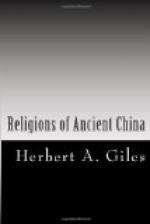Almighty God, Thou who
art impartial,
And dost appoint the
virtuous among men as Thy Assistants.
One of his poems is entitled “God Questions,” and consists of a number of questions on various mysteries in the universe. The meaning of the title would be better expressed by “Questions put to God,” but we are told that such a phrase was impossible on account of the holiness of God and the irreverence of questioning Him. One question was, “Who has handed down to us an account of the beginning of all things, and how do we know anything about the time when heaven and earth were without form?” Another question was, “As Nu-ch’i had no husband, how could she bear nine sons?” The Commentary tells us that Nu-ch’i was a “divine maiden,” but nothing more seems to be known about her.
The following prose passage is taken from Ch’u Yuan’s biography:—
“Man came originally from God, just as the individual comes from his parents. When his span is at an end, he goes back to that from which he sprang. Thus it is that in the hour of bitter trial and exhaustion, there is no man but calls to God, just as in his hours of sickness and sorrow every one of us will turn to his parents.”
The great sacrifices to God and to Earth, as performed by the early rulers of China, had been traditionally associated with Mount T’ai, in the modern province of Shantung, one of China’s five sacred mountains. Accordingly, in B.C. 219, the self-styled “First Emperor,” desirous of restoring the old custom, which had already fallen into desuetude, proceeded to the summit of Mount T’ai, where he is said to have carried out his purpose, though what actually took place was always kept a profound secret. The literati, however, whom the First Emperor had persecuted by forbidding any further study of the Confucian Canon, and burning all the copies he could lay hands on, gave out that he had been prevented from performing the sacrifices by a violent storm of rain, alleging as a reason that he was altogether deficient in the virtue required for such a ceremony.
It may be added that in B.C. 110 the then reigning Emperor proceeded to the summit of Mount T’ai, and performed the great sacrifice to God, following this up by sacrificing to Earth on a hill at the foot of the mountain. At the ceremony he was dressed in yellow robes, and was accompanied by music. During the night there was light, and a white cloud hung over the altar. The Emperor himself declared that he saw a dazzling glory, and heard a voice speaking to him. The truthful historian—the Herodotus of China—who has left an account of these proceedings, accompanied the Emperor on this and other occasions; he was also present at the sacrifices offered before the departure of the mission, and has left it on record that he himself actually heard the voices of spirits.




